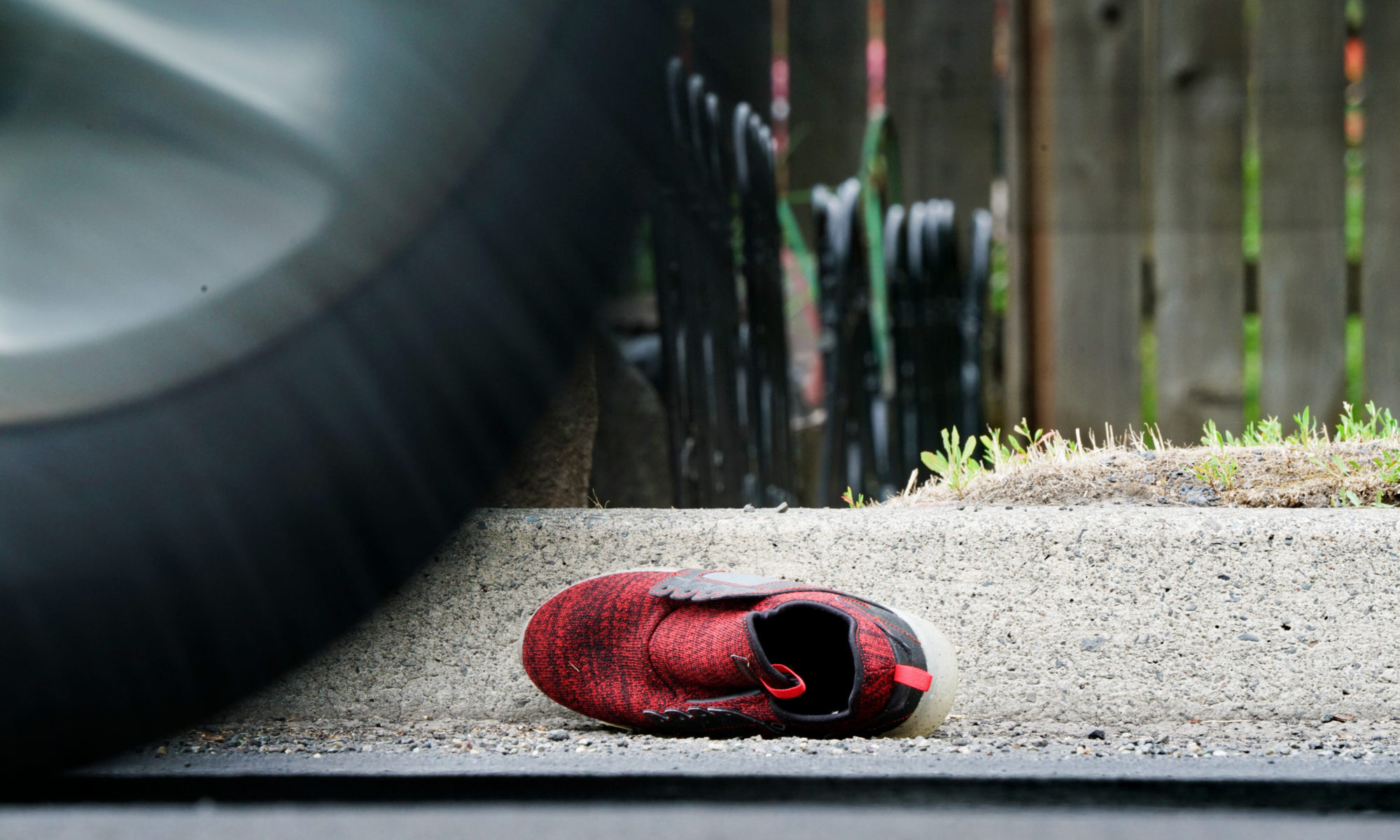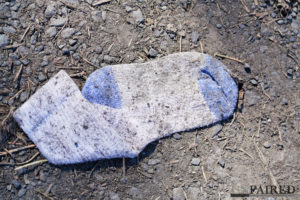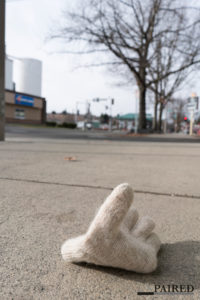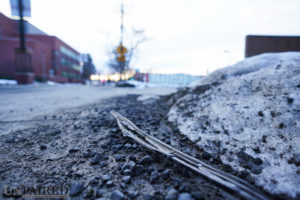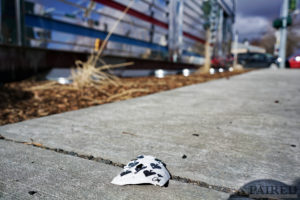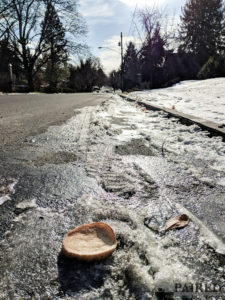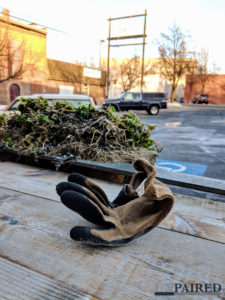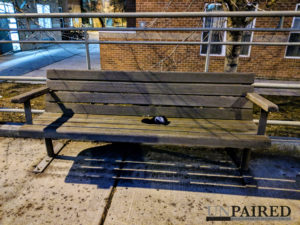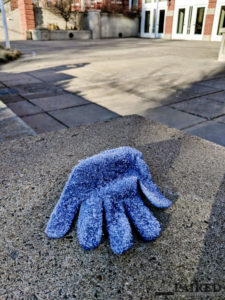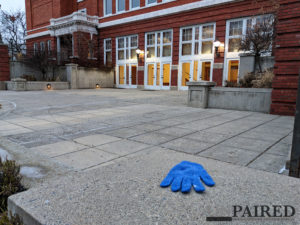Sometimes an unpaired item stays in its spot on one of my routes around town for a long time. The blue mitten that sparked this project was a companion on my walks for months. As of this writing, the white sock is still out there. But some items disappear almost immediately; I’ve returned to photograph locations after only a few minutes to find an item gone.
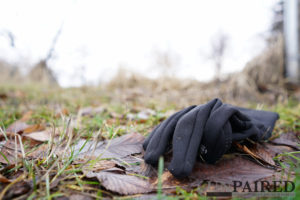
This glove is one of these short-term items. It appeared on the side of a path one afternoon and was gone the next time I walked by – perhaps an hour later. I hope its owner recovered it. In this story, I speculate that its owner – Emma’s dad – did recover it.
~
“Don’t need gwove. don’t need gwove. don’t need gwove,” Emma was chanting as her father rolled the stroller west from Hayes Street to the third house on the north side of East B street. It was 12:01 in the afternoon on Saturday January 27. The little girl continued to chant as he unbuckled her straps and set her on her feet. She was holding one small blue knit glove and one men’s black polyester, nylon and spandex glove.
As Emma climbed – knees and hands – the brick steps to the front door of the house, her father detached a pink pack from the handles of the stroller. He looked inside for a moment and then pulled the blankets from Emma’s seat and shook them out. He rolled them into a ball and crouched down to look in the stroller seat. A moment later he stood up and said, “Emma, where’s my glove?” Emma held out the hand with the small blue glove and said, “Gwove!” Emma’s mother came out the front door and scooped the girl into her arms.
Emma’s father said, “No, Emma, MY glove.”
The little girl held out the other glove and said, “Gwove!”
Emma’s father said, “No, Emma, my other glove.”
Emma held out both hands, alternated her gaze between the two and said, “gwove?” Emma’s mother laughed and said, “If I were you, I’d settle for the little blue glove.” Emma again looked at each hand in turn and held out the one with the blue glove to her father. Emma’s mother laughed some more.
Emma’s father smiled flatly and looked at his wife with his left eyebrow raised 1/8 inch higher than the right. Emma excitedly said, “Twained digty! Twained digty!” Both parents turned and looked at the little girl. Emma smiled and waved the two gloves in the air, took a breath and began to chant “Gwove, gwove. gwove…”
As Emma’s chanting continued and the family stepped into the house, 1.3 miles west-southwest a lanky man walking east on paradise path just west of Deakin Street suddenly stopped and looked to the grass on his right. After a moment, he unslung his bag, pulled out a camera and crouched down on the south edge of the path. He manipulated his camera for just under two minutes before standing, stowing his camera, adjusting the bag on his back and starting eastbound again.
Back on B Street, Emma’s dad re-emerged from the house. He put a black glove on his left hand and before placing it in one pocket and his ungloved right hand in the other of his green wool jacket. Just as he lifted his left foot to turn east toward Hayes Street, the door the the house opened and Emma’s mom stepped out onto the porch. He turned and looked at her. After 11 seconds of silence he said, “they’re my favorite gloves.”
Emma’s mom said, “we’ll get in the car and start at the other end, I assume you were at West Park.”
“You don’t have to,” he said. Emma poked her head around her mom’s knees and said, “twained digty?”
Thirteen seconds of silence ensued while Emma looked at her dad’s face and smiled. He shook his head and started East on B Street.
Emma’s mom placed her hand on Emma’s head and turned her around into the house. “What on earth did Lacey teach you, Emma?” The door closed as Emma’s dad turned right to head south on Hayes Street.
His head pointed resolutely down, sweeping left and right as he walked steadily south. As he crossed First Street onto the path that bisects East City Park from northeast to southwest, a metallic blue 2009 Subaru Forester driven by Emma’s mom turned west onto B Street from the Alley next to Emma’s house.
“Twained digty?” Emma’s dad said to the air as he passed the outdoor stage in the park.
The Subaru reached the dead end of B Street and turned left onto Adams. Emma’s mom said, “okay little girl I know this is a long shot, but what did you do with daddy’s glove.”
From her secure perch in the back seat Emma said, “don’t need gwove!”
“Well, your daddy certainly needs this gwove,” Emma’s mom said.
“Wacey don’t need gwove,” Emma replied. The Subaru stopped at Third Street between the red brick of the old high school and the gray stone of the United Methodist church. Emma’s mom raised her eyebrows and breathed out a chuckle. She turned her eyes to the rear view mirror and saw Emma’s hands palm-to-palm in prayer pose and the breathy chuckle turned into an audible laugh. Emma caught her mom’s eyes in the mirror and laughed with delight.
As the Subaru waited for a 1992 white Ford pickup and a 2012 white Ford pickup passing westbound on Third, Emma’s dad crossed Monroe street from the park and onto the Third Street sidewalk five blocks east. He nodded to a tall lanky man striding by eastbound toward the park then looked back down to scan the sidewalk and the grass on either side.
The Subaru turned onto Third Street and stopped for the red light at Washington behind the two pickups. Four blocks east, Emma’s dad crossed Polk Street.
The light at Washington turned green. After a moment, the trucks ahead of her began to move and Emma’s mom followed. She looked at the little girl in the mirror, “Why didn’t Lacey need the glove, Emma?”
“Wacey pwincess doesn’t need gwove because of pwince, mommy.”
“Right,” Emma’s mom said. “Makes perfect sense.”
“Okay,” Emma said as the car slowed to a stop at the light at Main Street. Emma’s mom laughed again.
Emma’s dad crossed Van Buren Street and slowed. He looked carefully in the mulch in the beds south east of the old high school building. As the Subaru began to roll forward on Third Street he stopped at the steps up to the building, looking around them, behind the pedestal at the corner of the courtyard and in the plantings above the short retaining wall. He again said, “twained digty?” to himself. A 14-year-old girl skipping down the steps turned and looked at him, flattening her mouth and squinting her eyes. Emma’s dad didn’t see her. She turned east as he continued west past the second set of steps up to the building.
The Subaru crossed Jackson Street. Four blocks behind the car, Emma’s dad turned south to cross Third Street at Jefferson. He walked through the Post office parking lot. He crossed Washington at Fourth Street. He crossed Fourth Street and skirted the Co-op parking lot. He turned west along the front of the Co-op and looked under the tables on the patio. He continued west into the alley and turned south. When he reached sixth street he turned west again and lengthened his stride.
As he waited to cross Main Street, the Subaru was 1/2 mile west heading south on Home Street toward West Park Elementary school . Emma’s mom parked the car in the empty lot north of the school. Emma said, “swing mommy?” as she was extricated from the buckles of her throne in the back of the Subaru. Emma’s mom said, “no, we’re going to try to find daddy’s gwove – glove.”
“Don’t need gwove,” Emma said with a bright smile but a low stern tone. The little girl threw her blue glove onto the ground at her mom’s feet. Emma’s mom leaned down and picked up the glove, pocketing it.
“Well, then we won’t have gloves.”
“Okay,” Emma said brightly. They walked around the school through the play area and up the ramp onto the path next to Paradise Creek.
They turned east on the path.
Emma’s dad was walking west on Sixth Street past the sandwich shop at Asbury Street. He again murmured “Twained digty?”
He veered right onto the path next to Paradise Creek just west of Deakin Street. As the path curved around to the left, he met Emma and Emma’s mom on the path. Emma squealed “daddy!”
“No luck?” Emma’s mom said after looking at his mismatched hands.
“Nope,” he said. Emma’s mom set the girl down on the path.
“I’m sorry. We can get another pair.”
“I suppose. Emma, stop. There’s a river there. It’s danger -” He stopped speaking as he watched Emma lean down and pick up his glove from the grass.
The little girl walked back toward her parents. She stopped on the edge of the asphalt three short steps from them and said, “don’t need gwove!” and threw the black glove at their feet. She smiled. Emma’s mom burst into laughter. Emma looked up at her and her smile broadened. Emma’s dad’s lips flattened into a strained smile and his left eyebrow raised 1/8 inch. Emma looked at him for a moment before she said, “twained digty!”
He breathed out a slight laugh and shook his head as he leaned down and picked up his glove. “I wish I knew what she was saying,” he said. He took the girls left hand. Emma offered her right hand up to her mom. Emma’s mom took the hand and they turned west and began walking hand in hand in hand.
